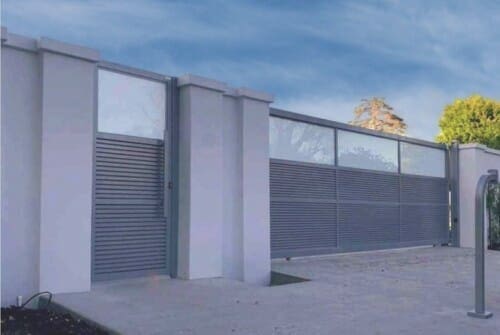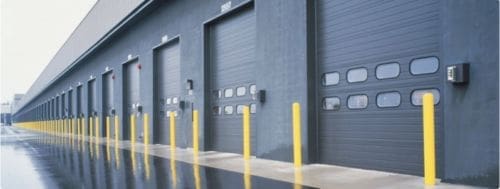Selecting the right gate material for commercial properties is a crucial decision that affects security, aesthetics, and long-term maintenance. For builders and commercial property managers, the debate often centers around steel vs. aluminum gates. Each material brings unique strengths to the table, but which one is right for your business? Whether you’re managing a shopping mall, office park, or industrial facility, understanding the differences between steel vs. aluminum gates can help you make the best choice for your project.
Security and Durability: Steel vs. Aluminum Gates
For commercial spaces, security is a top priority. Steel gates are known for their superior strength and durability, making them ideal for properties that need to prioritize protection. Industrial facilities, logistics centers, and warehouses often benefit from steel gates due to their ability to withstand impact and prevent break-ins. If security is your primary concern, steel is often the preferred choice.
Meanwhile, aluminum gates offer strong protection while being more lightweight and corrosion-resistant. While aluminum may not match the brute strength of steel, it is an excellent option for businesses in coastal areas or regions with high humidity, as it resists rust and requires less maintenance over time. This makes aluminum particularly appealing for commercial complexes or shopping centers where a sleek, modern look is desired without compromising durability.

Maintenance Needs: Steel vs. Aluminum Gates
Maintenance is an important consideration for property owners and builders. Steel gates offer unmatched strength but require regular upkeep to prevent rust, especially in wet or humid environments. Regular painting and treatment are necessary to keep steel gates in good condition, which can add to long-term operational costs.
Aluminum gates, on the other hand, require little to no maintenance. Their resistance to rust and corrosion makes them a hassle-free option for high-traffic commercial properties such as malls, office parks, or retail centers. Aluminum’s low-maintenance nature is a major benefit for business owners looking to minimize costs related to upkeep and repairs.
Cost Considerations for Commercial Properties
In commercial construction, budget management is always a priority. Steel gates are generally more expensive, both in material costs and installation due to their weight and the labor required. However, their longevity and superior security can justify the investment, particularly for properties where security is critical, such as factories or storage facilities.
By contrast, aluminum gates offer a more cost-effective solution. They are typically less expensive to install and require fewer resources for maintenance over time. For commercial spaces like shopping malls or corporate offices where aesthetic appeal is a factor, aluminum gates provide a stylish, budget-friendly option without sacrificing security.
Design Flexibility for Commercial Projects
In terms of aesthetics, steel vs. aluminum gates both offer unique design possibilities. Steel gates can be customized into intricate designs, making them a strong choice for commercial buildings that want to convey a sense of security and tradition. They’re often used in industrial settings or high-security zones where their solid, imposing look enhances the perception of safety.
Aluminum gates, however, offer more flexibility in design and can easily be tailored to fit modern, sleek aesthetics. The lightweight nature of aluminum makes it easier to work with, allowing for a wider range of contemporary designs that complement retail spaces, hotels, or corporate headquarters. Aluminum gates can also be powder-coated in various colors to align with branding or architectural styles.

Environmental Considerations
When choosing between steel vs. aluminum gates, it’s important to consider environmental factors. Properties located in coastal areas, or regions with high humidity and frequent rainfall, are better suited to aluminum gates due to their corrosion resistance. Aluminum gates will maintain their appearance and functionality even in harsh weather conditions, making them ideal for outdoor commercial spaces like shopping centers or waterfront properties.
Steel gates perform exceptionally well in dry, inland climates where corrosion is less of a concern. For industrial properties in these areas, the strength and security of steel may outweigh the maintenance required.
Conclusion: Steel vs. Aluminum Gates for Commercial Projects
When deciding between steel vs. aluminum gates for your commercial property, the right choice depends on your specific needs. Steel gates offer unparalleled security and durability, making them ideal for high-risk or industrial environments. However, they come with higher maintenance requirements and costs.
Aluminum gates provide a more versatile and cost-effective option, particularly for commercial spaces that require minimal maintenance and a modern aesthetic. Their corrosion resistance makes them perfect for coastal or humid environments, while still offering sufficient security.
At Radford Garage Doors & Gates, we understand the unique needs of commercial properties. Whether you’re building a high-security industrial facility or an elegant office complex, we offer steel and aluminum gate solutions tailored to your project. Contact us today to learn more about our commercial gate options.

San Diego:
9185 Chesapeake Dr.
San Diego, CA 92123
(858) 925-2700
Mission Viejo:
27281 Las Ramblas, Suite 200,
Mission Viejo, CA 92691
(949) 749-7665
Email:
info@radforddoors.com
Google Rating
4.9